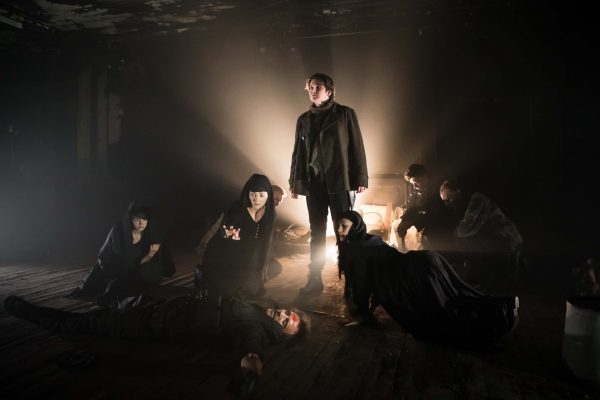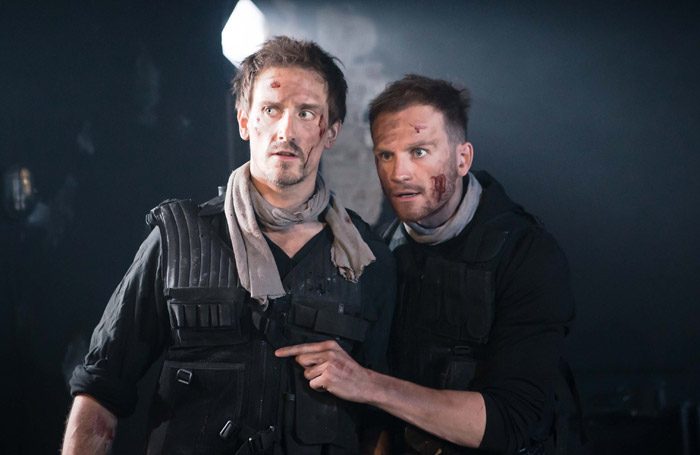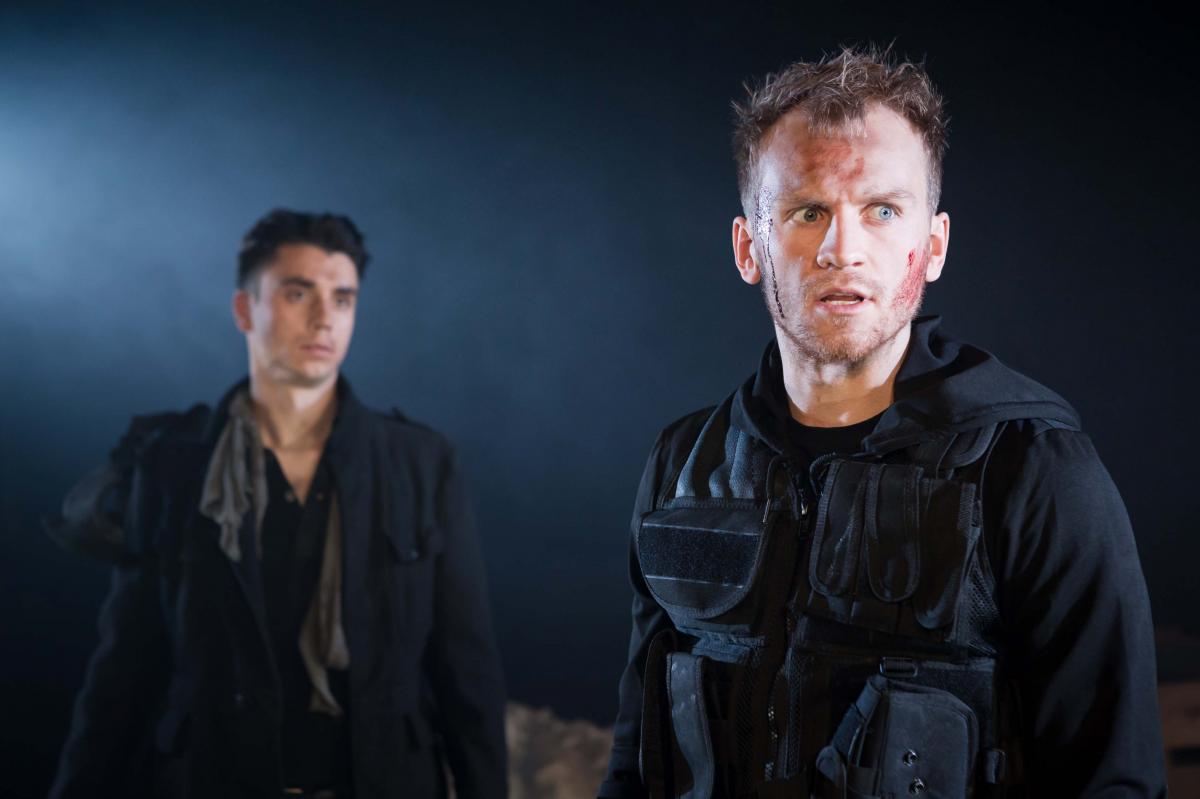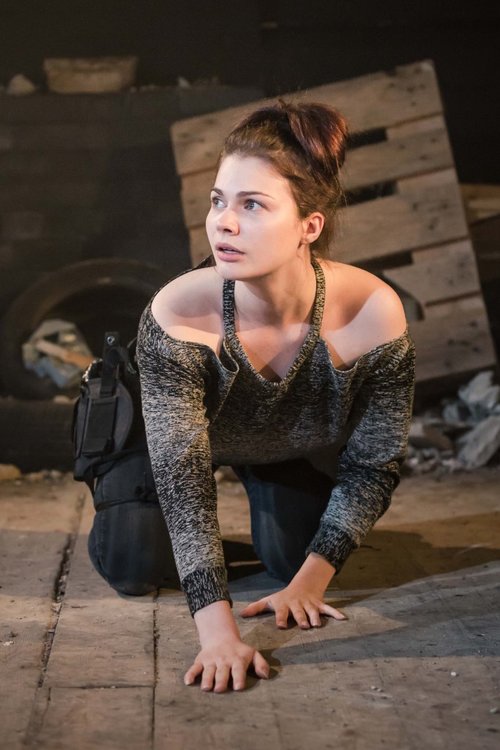



 . .. the performance of Macbeth at The CLF Theatre proved that Shakespearian texts can appeal to a modern audience whilst still maintaining the main features from the original writings. … director Paul Tomlinson had chosen to capitalise on one of Macbeth’s dominant thematic traits, war. I couldn’t believe the duration of the performance was over 2 ½ hours, as the pace of the piece kept my attention throughout, which is not something I can say for many previous performances of Macbeth I have seen – even though it is my favourite of Shakespeare’s plays. … the actors, added an incredible energy from start to finish, accompanied by some beautiful characterisation. The pace in the second half rose to a wonderful crescendo as the audience followed Macbeth’s slow descent into a blood-thirsty, maddening rage. … the director had made the wise decision to cut down large chunks of it. This allowed for the performance to maintain its engaging pace and for the plot to move along as quick as possible. There was barely a beat between scenes. This performance demonstrated how to carefully adapt Macbeth … It proved that an excellently executed version of Macbeth doesn’t have to rely heavily on expensive sets, costumes or props. Its predominant focus was upon the delivery of the text itself, which I’m sure would satisfy even the harshest of Shakespearian critics. However, a gentle warning to those who aren’t a fan of blood, there is a copious amount in this performance! Reviewed by Claire Minnit
. .. the performance of Macbeth at The CLF Theatre proved that Shakespearian texts can appeal to a modern audience whilst still maintaining the main features from the original writings. … director Paul Tomlinson had chosen to capitalise on one of Macbeth’s dominant thematic traits, war. I couldn’t believe the duration of the performance was over 2 ½ hours, as the pace of the piece kept my attention throughout, which is not something I can say for many previous performances of Macbeth I have seen – even though it is my favourite of Shakespeare’s plays. … the actors, added an incredible energy from start to finish, accompanied by some beautiful characterisation. The pace in the second half rose to a wonderful crescendo as the audience followed Macbeth’s slow descent into a blood-thirsty, maddening rage. … the director had made the wise decision to cut down large chunks of it. This allowed for the performance to maintain its engaging pace and for the plot to move along as quick as possible. There was barely a beat between scenes. This performance demonstrated how to carefully adapt Macbeth … It proved that an excellently executed version of Macbeth doesn’t have to rely heavily on expensive sets, costumes or props. Its predominant focus was upon the delivery of the text itself, which I’m sure would satisfy even the harshest of Shakespearian critics. However, a gentle warning to those who aren’t a fan of blood, there is a copious amount in this performance! Reviewed by Claire Minnit
 Broadway World Review : In a post post-industrial world reminiscent of Mad Max, mad Mac, his ambition ignited by witches, his masculinity challenged by his wife, his lust for murder growing with his lust for power, descends into bloody psychosis and a final reckoning with a man who (as in the first Mad Max movie) has a family’s blood to avenge. Devil You Know’s production gets a lot right – to the extent that I feel that I’m finally appreciating the play after years of writing it off as a bit of an upmarket gothic horror schlockfest with too many characters with similar names and motives and too much killing. That’s due to the clarity of the storytelling (led by director Paul Tomlinson) and acting that avoids histrionics to concentrate on the words, spoken with great sympathy for the rhythm of blank verse. These men and women may act like brutal savages but they sound like kings – an important lesson about how power can make itself manifest in many forms and why we should always be wary of its excess. Henry Proffit’s Macbeth has a constant gleam in his eye from the moment his unlikely path to the throne is prophesied by the Weird Sisters: a man of action, a man blinded by hubris, a man easily biddable for all his alpha male posturing. Sadie Pepperell looks young to play Lady Macbeth, but her youth and physical slightness (in a production reeking of testosterone, as large men wield machetes and knives with a visible heft to them) plays well, as she goads her husband in her famous (or infamous) unsexed ruthlessness. Amidst all this physical violence, the capacity of language to provoke extremes of behaviour is undiminished and, crucially, very credible. There’s strong work from the support cast too, with Jared Fortune emotional and single-minded as Macbeth’s nemesis, Macduff and Cameron Crighton a splendidly accusatory Banquo, winning the hotly contested prize for most bloodstained face in the show. There’s a fine turn from JK Glynn as the coarse Porter, channeling a bit of Sid James from his Carry-On days, providing us with a little comic relief and himself with er.. relief of a different kind. Though some may prefer their Shakespeare more epic in scale and showy in performance, this production is done exactly as I like to see The Bard’s work done. Stripped back in set (though Ben Jacobs’ lighting creates exactly the right atmosphere) and shorn of any obvious allusions to current concerns, we get the text and the acting, the violence and the comedy, the supernatural hocus-pocus and the oh so human vulnerability to temptation. It succeeds. Reviewed by Gary Naylor
Broadway World Review : In a post post-industrial world reminiscent of Mad Max, mad Mac, his ambition ignited by witches, his masculinity challenged by his wife, his lust for murder growing with his lust for power, descends into bloody psychosis and a final reckoning with a man who (as in the first Mad Max movie) has a family’s blood to avenge. Devil You Know’s production gets a lot right – to the extent that I feel that I’m finally appreciating the play after years of writing it off as a bit of an upmarket gothic horror schlockfest with too many characters with similar names and motives and too much killing. That’s due to the clarity of the storytelling (led by director Paul Tomlinson) and acting that avoids histrionics to concentrate on the words, spoken with great sympathy for the rhythm of blank verse. These men and women may act like brutal savages but they sound like kings – an important lesson about how power can make itself manifest in many forms and why we should always be wary of its excess. Henry Proffit’s Macbeth has a constant gleam in his eye from the moment his unlikely path to the throne is prophesied by the Weird Sisters: a man of action, a man blinded by hubris, a man easily biddable for all his alpha male posturing. Sadie Pepperell looks young to play Lady Macbeth, but her youth and physical slightness (in a production reeking of testosterone, as large men wield machetes and knives with a visible heft to them) plays well, as she goads her husband in her famous (or infamous) unsexed ruthlessness. Amidst all this physical violence, the capacity of language to provoke extremes of behaviour is undiminished and, crucially, very credible. There’s strong work from the support cast too, with Jared Fortune emotional and single-minded as Macbeth’s nemesis, Macduff and Cameron Crighton a splendidly accusatory Banquo, winning the hotly contested prize for most bloodstained face in the show. There’s a fine turn from JK Glynn as the coarse Porter, channeling a bit of Sid James from his Carry-On days, providing us with a little comic relief and himself with er.. relief of a different kind. Though some may prefer their Shakespeare more epic in scale and showy in performance, this production is done exactly as I like to see The Bard’s work done. Stripped back in set (though Ben Jacobs’ lighting creates exactly the right atmosphere) and shorn of any obvious allusions to current concerns, we get the text and the acting, the violence and the comedy, the supernatural hocus-pocus and the oh so human vulnerability to temptation. It succeeds. Reviewed by Gary Naylor
 “Nothing screams ‘welcome to this production of Macbeth’ better than a full-body skeleton sitting centre stage. This was the first character I met at the CFL Art Cafe in the Bussey Building – a suggestive performing space, large enough to allow an interesting setting that gives you the chills when the lights go out. I found the visuals and sounds particularly beautiful – especially if you have a thing for dark and stormy nights, blood-thirsty characters, and violent actions. …the raw savagery of the plot found its perfect expression in this broken, hopeless imitation of humanity. The witches movements had something feral, that belongs to wild beasts rather than humans.. “ Reviewed by Alessandra Cenni
“AN ENTHRALLING & INTRIGUINGLY ATMOSPHERIC VERSION THAT ABLY CAPTURES A SOCIETY IN DISTURBING DESPAIR” “Director Paul Tomlinson certainly found an appropriately up-to-date setting for this well-known and often-produced bloody tale of power gained through murder and betrayal. We find ourselves in a society in ruins with little more than rubble as the central feature. It doesn’t take a genius or a philosophical giant to relate the set here to scenes we see all too often in harrowing news reports about the continued fighting in the Middle East which has resulted in enormous, once prosperous cities turned into piles of debris. The Company
And that certainly adds an atmosphere of gloom and despondency to layer with the main themes of power and evil that loom fairly large in Shakespeare’s tragedy. But there’s rather more to the setting than merely the destruction of buildings – though the warriors sport weapons, most of them are merely knives and cleavers suggesting that technology has all but been consigned to the dustbin of history, or the one the all-knowing witches use as a makeshift cauldron here. In fact, the time period is some considerable distance in the future where something has gone terribly awry with society as a whole. Now, the name of the game is survival, but Kingship is still where power resides and Henry Proffit’s Macbeth is easily swayed to consider that he can be top dog when the suggestion is cast in his direction by a group of veil-shrouded, squirming witches whose faces we barely see. The play itself starts with the grim image of a skeleton sitting en repos on a chair in the middle of the stage. Lifeless it may seem, but when the witches get their hands on it we discover it still has blood coursing through its bones!
And that start really sets the bloody mood and action for an enterprise which hardly pulls any punches in terms of relentless, blood-soaked violence. Ben Jacobs’ highly effective lighting shines literally through a perpetual haze as though whatever event brought civilisation low, still lingers in the air.
Henry Proffit’s laudable Macbeth is obviously an intelligent fighter and survivor, but just beneath the surface of what appears a fairly normal exterior lies something murkily odd and unnerving, perhaps psychopathic, probably deranged. Jared Fortune impresses immensely in the highly moving scene where he learns of the butchery of his family – including all his “little chickens”. The lasting, almost tangible flavour of this production is one of consummate, impressive professionalism both in the acting from a well-cast and skilled ensemble and meticulously efficient, obviously passionate direction from Paul Tomlinson. Treading a well-worn path by presenting a well-known play is no easy task, but this enthralling and intriguingly atmospheric version of Macbeth ably captures a society in disturbing despair through the corrupting effects of power. Reviewed by Peter Brown
“Nothing screams ‘welcome to this production of Macbeth’ better than a full-body skeleton sitting centre stage. This was the first character I met at the CFL Art Cafe in the Bussey Building – a suggestive performing space, large enough to allow an interesting setting that gives you the chills when the lights go out. I found the visuals and sounds particularly beautiful – especially if you have a thing for dark and stormy nights, blood-thirsty characters, and violent actions. …the raw savagery of the plot found its perfect expression in this broken, hopeless imitation of humanity. The witches movements had something feral, that belongs to wild beasts rather than humans.. “ Reviewed by Alessandra Cenni
“AN ENTHRALLING & INTRIGUINGLY ATMOSPHERIC VERSION THAT ABLY CAPTURES A SOCIETY IN DISTURBING DESPAIR” “Director Paul Tomlinson certainly found an appropriately up-to-date setting for this well-known and often-produced bloody tale of power gained through murder and betrayal. We find ourselves in a society in ruins with little more than rubble as the central feature. It doesn’t take a genius or a philosophical giant to relate the set here to scenes we see all too often in harrowing news reports about the continued fighting in the Middle East which has resulted in enormous, once prosperous cities turned into piles of debris. The Company
And that certainly adds an atmosphere of gloom and despondency to layer with the main themes of power and evil that loom fairly large in Shakespeare’s tragedy. But there’s rather more to the setting than merely the destruction of buildings – though the warriors sport weapons, most of them are merely knives and cleavers suggesting that technology has all but been consigned to the dustbin of history, or the one the all-knowing witches use as a makeshift cauldron here. In fact, the time period is some considerable distance in the future where something has gone terribly awry with society as a whole. Now, the name of the game is survival, but Kingship is still where power resides and Henry Proffit’s Macbeth is easily swayed to consider that he can be top dog when the suggestion is cast in his direction by a group of veil-shrouded, squirming witches whose faces we barely see. The play itself starts with the grim image of a skeleton sitting en repos on a chair in the middle of the stage. Lifeless it may seem, but when the witches get their hands on it we discover it still has blood coursing through its bones!
And that start really sets the bloody mood and action for an enterprise which hardly pulls any punches in terms of relentless, blood-soaked violence. Ben Jacobs’ highly effective lighting shines literally through a perpetual haze as though whatever event brought civilisation low, still lingers in the air.
Henry Proffit’s laudable Macbeth is obviously an intelligent fighter and survivor, but just beneath the surface of what appears a fairly normal exterior lies something murkily odd and unnerving, perhaps psychopathic, probably deranged. Jared Fortune impresses immensely in the highly moving scene where he learns of the butchery of his family – including all his “little chickens”. The lasting, almost tangible flavour of this production is one of consummate, impressive professionalism both in the acting from a well-cast and skilled ensemble and meticulously efficient, obviously passionate direction from Paul Tomlinson. Treading a well-worn path by presenting a well-known play is no easy task, but this enthralling and intriguingly atmospheric version of Macbeth ably captures a society in disturbing despair through the corrupting effects of power. Reviewed by Peter Brown